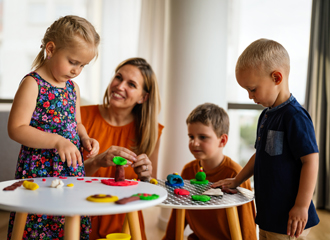After-school programs also come with a wide variety of physical, mental, and emotional benefits for kids. After-school clubs can help improve academic performance, allow kids to discover new passions and hobbies, nurture life skills, and so much more.
Improved academic performance
Kids who participate in structured after-school programs see improved academic performance, according to a study by SMU’s Simmons School of Education and Human Development. Not only did students’ grades improve, but the researchers noticed better attendance, as well as higher grade point averages in some cases.
Higher confidence and self-esteem
Participation in after-school clubs can lead to better academic performance, which goes hand-in-hand with another benefit: higher confidence and self-esteem. Kids who join after-school clubs are often pursuing a hobby, skill, or subject that they enjoy. As they get better at this activity, they might see a boost in their confidence and self-esteem. That carries over into their outlook and performance in school.
Developing real-world skills
An after-school activity teaches kids so much more than the activity itself. Real-world skills, or life skills, are developed alongside the skills with a new activity. For example, your child might join an after-school soccer club because they love playing the sport. They’ll get better at handling a soccer ball and keeping up their physical health. Plus, they’ll learn essential life skills like teamwork, communicating with their teammates, and perseverance. They’ll also learn skills like time management: how to prioritize after-school club attendance with school, homework, chores, and family duties. The skills they learn in after-school programs can benefit them in the future.
Foundation for the future
Speaking of the future, we all know that a well-rounded student with extracurricular activities is often a more attractive applicant when it comes to college acceptance. That’s also true for jobseekers: hiring managers will sometimes assess a person’s abilities and work habits through their passions outside of their career.
Getting involved in extracurricular activities at a young age can help kids see the value in having regular hobbies, a value that will carry into their future beyond school.
Participation in healthy activities
We’ve discussed the emotional and mental benefits to after-school clubs. Let’s not forget the physical benefits of participating in after-school activities, too! Certain extracurricular programs like team sports, dance, or self-defense gets kids outside and physically active. Even if the extracurricular program isn’t considered a “physical activity,” participating in something like drama, robotics, or speech and debate is still good for physical health. Pursuing a hobby can reduce stress, lessen screen time, and encourage healthy lifestyle habits.
Good for the whole family
After-school programs are certainly great for kids, but parents can benefit as well. When working parents are unable to pick up their children after the school day finishes, after-school clubs provide a safe place for kids to spend their time. Rather than hiring a childcare provider for the hours until the workday ends, parents can have peace of mind knowing where their kids are and what they’re doing.
Instead of vegging out at home on the couch with a babysitter, kids can practice a musical instrument, or play basketball with friends, or write and read in a quiet room at school. Even better, kids can practice their skills and enjoy their hobbies under the supervision of an adult who can guide or help them if needed.
Choosing Smart Kids Club for your child
Looking for your child’s next after-school club? Smart Kids Club has a wide variety of programs for your kids. Feel free to learn more on our website: https://www.smartkidsclubs.com/our-services/





